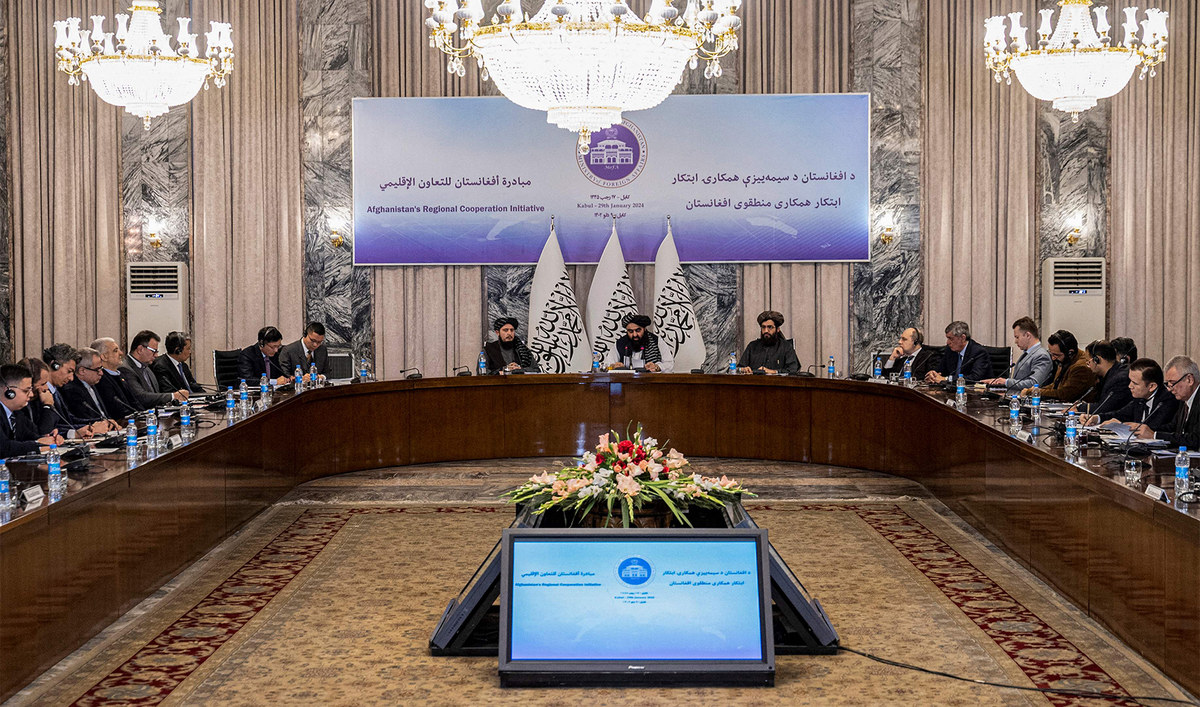Nearly 30 meetings have been held over the past year by regional and international countries regarding the situation in Afghanistan.
In these meetings, Afghanistan’s political, security, and human rights situation were discussed. One of these meetings was the third Doha meeting, hosted by the Deputy Secretary-General of the United Nations.
A meeting titled “Afghanistan Regional Cooperation Initiative” was held on the 9th of Dalwa 1402 (January 29, 2024), at the Ministry of Foreign Affairs in Kabul, with the participation of representatives and ambassadors from more than ten countries.
Amir Khan Muttaqi, the acting Minister of Foreign Affairs, described the meeting as focused on examining ways of regional cooperation based on mutual regional interests and respecting governance methods.
He stated during the meeting, “The security, stability, and development of Afghanistan benefit the region, and there should be no cooperation in regional insecurity.”
The second and third Doha meetings were among the most important regional meetings about Afghanistan, held in the Qatari capital with representatives from various countries. The second Doha meeting on Afghanistan took place on February 18-19, 2024, with representatives from over thirty countries and international organizations.
Key issues discussed at the second Doha meeting included consultations on Afghanistan, increasing international engagement in a coherent and structured manner, appointing a UN special representative for Afghanistan, identifying fundamental features for constructive and principled engagement, and global concerns about the policies of the Islamic Emirate.
However, no representative from the Islamic Emirate was present at this meeting.
The UN Secretary-General said at the end of the second Doha meeting, ” In fact, I received a letter with a set of conditions to be present in this meeting that were not acceptable. These conditions first of all denied us to talk to other representative of the Afghan society and demanded a treatment that would to a large extent be similar to recognition.”
However, unlike the second Doha meeting, the third Doha meeting was held with the participation of an Islamic Emirate representative after extensive consultations. The third Doha meeting was led by the UN Deputy Secretary-General for Political Affairs, and Zabihullah Mujahid led the Islamic Emirate delegation.
Zabihullah Mujahid said that the international community pledged to make efforts to provide alternative crops for opium, and humanitarian assistance.
Mujahid said, “All countries, including the United States, have pledged to assist Afghanistan and not support any military side.”
Russia also held two meetings on Afghanistan. One of these meetings took place in Kazan with the participation of the Islamic Emirate delegation, and the other was held in Moscow with the presence of political opponents of the Islamic Emirate.
The fifth Moscow Format meeting on Afghanistan was held on September 28, 2023, in Kazan, Russia, with representatives from over ten countries, including the Islamic Emirate delegation. This meeting discussed Afghanistan’s current situation, intra-Afghan talks, the reconstruction of Afghanistan after years of war, and ensuring the security of regional countries.
Moreover, a meeting titled “Afghanistan Between the Past and the Future” was hosted by the Russian Justice Party on November 23, 2023, in Moscow, with the participation of Islamic Emirate opponents and representatives of some countries. Participants in this meeting discussed the formation of an inclusive government, the situation of women and girls in Afghanistan, the United Nations’ approach to Afghanistan, and other issues.
The Afghanistan Future Thought Forum meeting on the August 19, 2023, “Afghanistan in the past and future” was held on October 27, 2023, the 11th Herat Security Dialogue on November 27, 2023, the Vienna meeting on December 5, 2023, and the Oslo meeting on May 16, 2024, were held by opponents of the Islamic Emirate; these meetings were considered fruitless by the Islamic Emirate.
The United Nations, the UN Security Council, and the UN Human Rights Council have held more than thirteen meetings regarding Afghanistan. Most of these meetings, alongside constructive engagement with the Islamic Emirate, discussed human rights, especially the rights of women and girls, the formation of an inclusive government, and the non-use of Afghan territory against other countries.
The UN Security Council meetings included discussions on extending UNAMA’s mandate in Afghanistan, the independent review by the UN’s special coordinator for Afghanistan, the UN Security Council meeting hosted by Switzerland on Afghanistan, the UN Security Council meeting on the situation of women and girls in Afghanistan, the UN Security Council’s consultation on a draft resolution for an independent UN assessment of Afghanistan’s situation, the UN Security Council meeting on how to increase global common approaches more coherently and structurally, the UN Security Council meeting on the appointment of a special representative of the United Nations for Afghanistan, UNAMA’s mandate extension consultation, Roza Otunbayeva’s quarterly report at the UN Security Council, the UN’s meeting on the situation of Afghan women during “Women, Peace, and Security” week, the UN meeting hosted by the delegations of Canada, Qatar, and the UK to assess the situation in Afghanistan, and the UN Human Rights Council meeting on Afghanistan.

